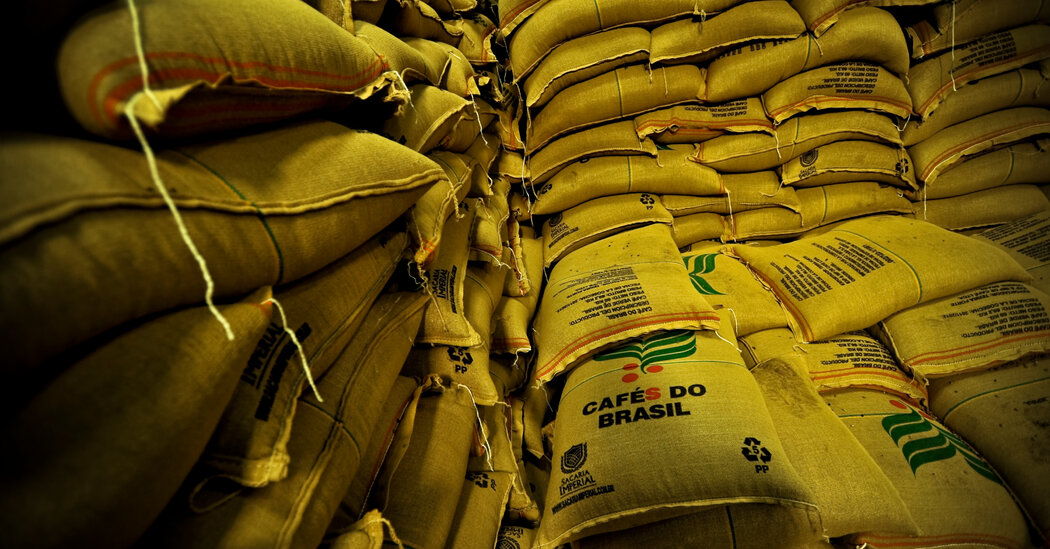Price lists don’t seem to be the one danger to trade for giant firms promoting espresso in america. On Thursday, a watchdog crew petitioned the Trump management to dam espresso imports that it says are produced with pressured exertions similar to modern day slavery in Brazil, the sector’s biggest espresso grower.
The petition to Customs and Border Protection, filed by means of the nonprofit Espresso Watch, names Starbucks, by means of a long way the most important espresso store within the nation, in addition to Nestle, Dunkin’, Illy, McDonald’s and Jacobs Douwe Egberts, the landlord of Peet’s, as firms that depend on probably doubtful resources. It asks the Trump management to not permit distribution of any imports from Brazil that “wholly or partially” depend on human trafficking and compelled exertions.
“This isn’t about a couple of unhealthy actors,” Etelle Higonnet, the founder and director of Espresso Watch, mentioned in a statement. “We’re exposing an entrenched machine that traps hundreds of thousands in excessive poverty and 1000’s in outright slavery.”
The request for U.S. motion was once filed an afternoon after any other crew, World Rights Advocates, sued Starbucks in federal court on behalf of 8 Brazilians who had been trafficked and forced to toil in “slavery-like prerequisites,” mentioned Terry Collingsworth, a human rights legal professional and the founding father of the crowd.
The swimsuit seeks certification as a category motion representing 1000’s of staff who it says have confronted the similar plight whilst harvesting espresso for a significant Starbucks provider and regional growers’ cooperative in Brazil known as Cooxupé.
“Starbucks must be responsible,” Mr. Collingsworth mentioned in an interview, including that “there’s a huge trafficking and compelled exertions machine in Brazil” that the corporate advantages from.
Amber Stafford, a spokeswoman for Starbucks, denied the allegations and mentioned the corporate was once dedicated to moral sourcing, together with serving to to offer protection to the rights of people that paintings at the farms its espresso comes from. “The cornerstone of our paintings is our Coffee and Farmer Equity (C.A.F.E.) Practices verification program, which was once evolved with outdoor professionals and contains tough third-party verification and audits,” she mentioned in an electronic mail.
Mr. Collingsworth contends that in spite of the verification program, the corporate has no longer made its practices clear. The lawsuit, he mentioned, will assist his crew get extra details about the corporate’s provide chains.
A number of of the corporations named within the petition to dam imports participate, along side the Rainforest Alliance, within the Sustainable Coffee Challenge, whose mentioned goals come with bettering the lot of agricultural staff. Except Starbucks, the corporations both didn’t reply to requests for remark or declined to take action.
The advocacy teams issued a joint remark on Thursday, announcing their efforts divulge “the hidden human value at the back of one of the crucial country’s maximum cherished commodities: espresso.”
The teams’ function is to disrupt a section of the Brazilian espresso business that they are saying provides firms out of the country partially by means of trafficking susceptible staff. The espresso sector in Brazil was once based on slavery and persisted to depend on it, they are saying, despite the fact that Brazil abolished slavery in 1888.
The teams say that unlawful exertions agents — referred to as “gatos” or “cats” — search out staff from deficient, rural communities, a few of whose population descend from enslaved folks, making false representations about jobs and advancing budget for meals and trip. The laborers finally end up in “debt bondage,” operating off what they owe by means of harvesting espresso below prerequisites no longer so other from the ones in their enslaved forebears.
Different human rights groups, in addition to news organizations and the U.S. government have reported equivalent findings.
In April, 4 espresso manufacturers which are a part of the Cooxupé collective had been added to a slave labor blacklist by means of the Brazilian government after inspectors discovered dozens of staff, together with a youngster, who had been being subjected to prerequisites similar to slavery, in step with Repórter Brasil, a Brazilian nonprofit.
In some circumstances, the employees shouldn’t have working water, beds or bogs, in step with advocacy teams. They paintings lengthy hours with out protecting apparatus and incessantly don’t obtain their complete wages or any pay.
The Brazilian executive has many times taken motion, however as a result of espresso harvesting is a seasonal process, it’s not matter to as a lot tracking as different fields of employment.
The 8 staff within the Starbucks criticism withheld their names out of concern of retributionat house. “Those traffickers are unhealthy guys,” Mr. Collingworth mentioned. Staff who attempt to go away or document abuses face dying threats and are incessantly averted from leaving the farms, he mentioned.
The prison movements had been in accordance with information from the Brazilian government, nonprofits and newshounds “appearing a chronic development of work abuses all through Brazil’s espresso sector,” the advocacy teams mentioned. The machine, rights advocates contend, is strengthened by means of firms out of the country who depend on Brazilian providers — and by means of unwitting American customers.
“No espresso produced by means of slaves will have to input American properties,” mentioned Ms. Higonnet of Espresso Watch.



